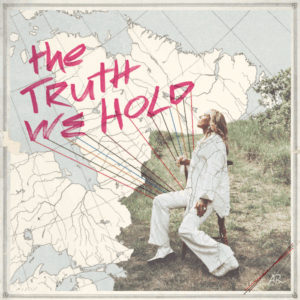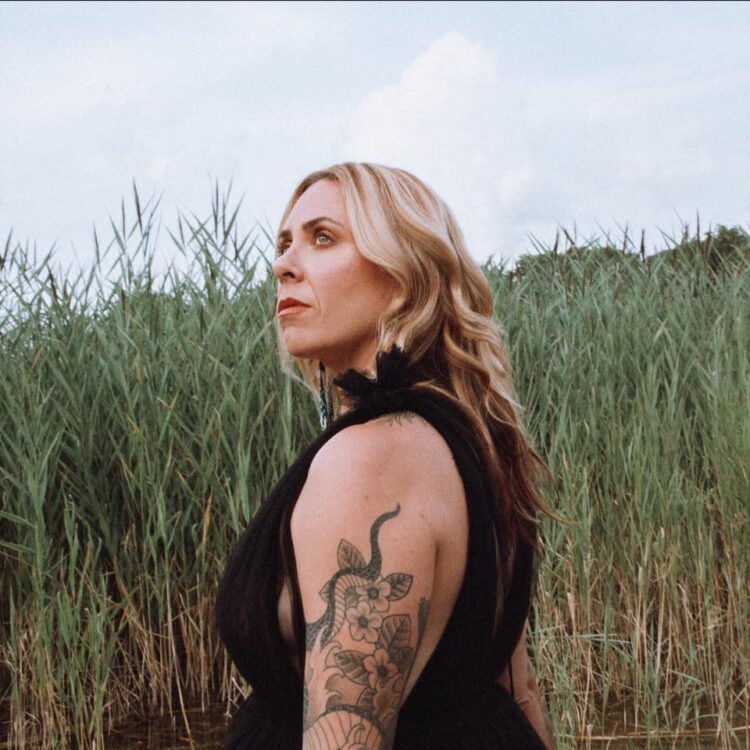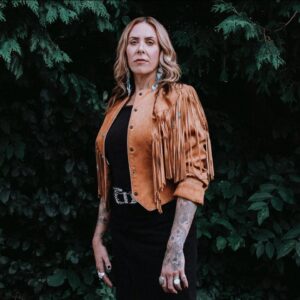
By Jim Barber
Sometimes a work of art is more than just something to aesthetically admire or be entertained by. For Ottawa-based singer/songwriter Amanda Rheaume music has become a potent and persuasive tool that can breach the boundaries of what art can do in the world, as a force of good and a force of change.
It’s been a truly wonderful experience for her fans, the music industry and the broader community of humans to see how Rheaume has evolved as an artist and as a human into a confident cultural leader who utilizes her platform and talents for a higher purpose. It is a transformation that has required much work, much contemplation, much soul-searching and increasing gravity and responsibility for the songs she writes, the words she speaks, the actions she takes and the priorities she believes in.
With her new album, The Truth We Hold, released on Ishkode Records, the label she co-founded, Rheaume becomes a storyteller in every aspect of the term, not only crafting and recording songs that celebrate the vibrancy and challenging heritage of her Métis culture, but going beyond to incorporate traditional tunes, compelling archival photography, and extended explanations in an accompanying guidebook of the stories behind the songs. It is an album created with purpose beyond both commercial gain and desire for self-satisfaction or accolades. It is a work of artistry that is meant to educate, illuminate and remediate forgotten aspects of our collective history as those who share the land called Canada.
“I believe there are so many Canadians and people in the world outside Canada that don’t even know who the Métis people are. I do think there’s some demystification needed, because there’s a lot of misinformation and deliberate disinformation and confusion around who Métis people are. So, for me, it’s about lifting up real Métis people and their stories and experiences of the past, present and songs for the future – it all just feels like generational work,” said Rheaume of the purpose behind the album, which saw her crisscrossing the northern half of the continent, meeting with Métis community members, gathering information, learning about things that are not now, nor ever have been taught in the history books of Canada.
“I guess another thing for me is telling stories that are untold. Like what happened in Agawa Bay [in the song ‘One of These Days’] and people say, ‘what do you mean that the government burned down houses in Agawa Bay in the 1960s?’ Even when I heard the story for the first time, I tried to Google it and I couldn’t find anything about it. Now, you may be able to find one thing about it. Métis people were also called ‘the forgotten people’ for so long, which is why I wrote the song ‘Unforgettable.’ Over the years there’s been this passing the buck back and forth between the federal and provincial governments that has really been damaging, because in so many cases, no one has taken responsibility or been accountable to the Métis people and our rights and our histories.
 “I think that everyone should know this history and hear these stories. I could talk about this forever, but I guess I will say that I am also really interested in celebrating the places where we can find our similarities and our shared values and our kinship, instead of the places where we find our differences in opinions, beliefs and values. I do find it’s a pretty polarized place these days – the world, society, social media, you know. So my hope is that we can find each other in these stores and in these songs and use them to look back to see where we were, where we are now and where we can go in the future.”
“I think that everyone should know this history and hear these stories. I could talk about this forever, but I guess I will say that I am also really interested in celebrating the places where we can find our similarities and our shared values and our kinship, instead of the places where we find our differences in opinions, beliefs and values. I do find it’s a pretty polarized place these days – the world, society, social media, you know. So my hope is that we can find each other in these stores and in these songs and use them to look back to see where we were, where we are now and where we can go in the future.”
Over the span of four albums, beginning with Holding Patterns in 2017, followed by the revelatory The Skin I’m In (2019) and 2022’s The Spaces In Between, Rheaume’s has been an exceptionally beautiful and compelling journey to follow and experience in real time. On the The Skin I’m In album we see someone who was struggling with the complications and seeming contradictions of her personal identity as a member of the Queer community within the framework of traditional Indigenous beliefs, but also someone who was struggling with her identity and how she presented as a ‘blonde haired, blue eyed’ Métis. In the subsequent album, she comes to embrace her delightfully multifaceted identity and her ancestral culture in all its vitality and reverence. Today we are presented with someone who has become immersed in the stories of her people, taking ownership of her own place within those stories and the role of making sure they’re heard.
The author of this article has to admit bias because he has helped document parts of this journey over the past decade in previous articles, and it has affected not only the relationship between writer and artist (we’re pals now), but his entire worldview. In short, Amanda Rheaume’s dedication to her role is as worthy of commendation and admiration as it is impactful, beyond just enlightening a 56-year-old white settler descendant.
“When I listen to my older albums I’m like, yeah, I’m still looking for it here. It’s not fully realized or boiled down. And I was not planning on this path at all. But there are lots of things that I didn’t plan. I didn’t plan to work with Shoshana Kish [Digging Roots] to help create the Indigenous Music Summit. I never planned to start a record label [Ishkode Records, again with Kish and others]. It was just like this life and this path has come to me honestly,” she explained.
“But I have been thinking about it a lot. Both my grandfathers were leaders. My dad’s dad, Gene, was an MP [Member of Parliament] and he was a f***ing strong-willed smart leader, fighting for the rights of Indigenous people all of his political career. And then my mom’s dad was an explorer for the Navy. He was on the first deep sea vessel that circumnavigated North America going through the Northwest Passage. I think I am starting to kind of accept this, I guess, path. And I want to do it in a good way. I do feel, too, I’m getting to an age where I have come to see it as a responsibility. When you know something, you can’t unknow it. Because I am not young any more, I am just going to do what I’m going to do a lot more now. I’m not as worried about what people think. I certainly don’t think I could sit around now and just wonder what my role is moving forward.”
With the release of The Truth We Hold, Rheaume has not only continued to be a valued and effective story teller for her people but is now taking a leading role in the conversations for, with and about the Métis people’s legacy, growing sense of empowerment and future as a nation. She has added the role of advocate to that of artist and understands that, beyond creating music that represents the tragedies and triumphs of her culture and nation, she has also become a researcher, documentarian and speaker of truth, with a resonant voice calling for recognition and restoration.

“I really wanted to have at least one song from different regions of Métis. There are Métis people in BC and the Northwest Territories but I just focused on Alberta, Saskatchewan, Manitoba and Ontario because those where places I had connections. But maybe this will expand and there’ll be a volume two and I’ll get to go to other places and different communities in these provinces. That would be cool actually,” she said.
“There’s almost too much work begging to be taken on to the point where I wish I could do everything I want to do. But whatever comes down the road, I know I will continue to be involved in the Indigenous music community and advocating in that way. But I am also getting super obsessed with policy work. My grandpa has said, ‘if you want to get something done, you have to do it politically.’ So I find myself asking, where’s the point where we need to get in, to crack it all open. I think I’ll continue to do the things I’m doing and who knows what will happen.”
It was important for Rheaume to present the Métis as the well-rounded, significant, wonderfully creative, diverse and compelling people that they are, instead of focusing only on anecdotes about exploitation, oppression and tragedy, which plays into the settle mentality that they’re just victims. On The Truth We Hold, there are a cast of wonderful characters, uplifting stories and examples of resiliency, headlined by the delightful songs ‘Flossie’s,’ about homespun kitchen parties, and ‘Annie’s Whip,’ which tells the tale of a fiesty, non-nonsense badass who suffered neither fools nor racists.
“For a long time and maybe even still, Métis families struggled. Many would go fully underground within Canadian society because they were white passing. But I don’t want to speak for anybody but despite things being hard, and Métis facing racism or facing displacement Métis people would still come together and they would be in community and have music and have food. I do hope that this album showcases the resilience of a people, because it’s really beautiful and remarkable,” she said.
One of those beautiful and remarkable stories of resiliency is told over two songs. In ‘#44’ and ‘Dream If You Want To’ the story of residential school survivor Robert Merasty encapsulates his experiences of anguish, bureaucratic indifference, but ultimately strength and survival.
“I wanted to be really respectful with the stories, especially with Robert. He’s still alive and that community [Île-à-la-Crosse in Saskatchewan] has been through hell with this battle to be recognized as having a residential school. Neither the provincial nor federal government would recognize it as a residential school because it was in a Métis community so it didn’t qualify under the [2016] Indian Residential Schools Settlement Agreement. Many survivors have died and didn’t get the chance to see the moment when the recognition happened, and the recognition actually happened [March of 2025] just before my album came out, which is really crazy,” she said.
“With Robert, I feel and felt a massive responsibility. I asked him what he thought about me writing a song at all, and I hadn’t even met him yet. I heard an interview with Robert on a podcast but that was after I had been to the community. I wrote to him and said, ‘listen, I am writing this record of Métis stories and I would be honoured if you’d be open to the idea of me writing a song about you and your story.’ And he said yes, I told him I would send it to him before I recorded it to see if he liked it. My thinking was what if he hated it. Or what if it was too emotional, then I wasn’t going to put it on the album unless he was okay with it. So he gave me the thumbs up.
“Right before my Saskatoon show earlier this year, [Métis fiddler extraordinaire and Rheaume band member] Alyssa Delbaere-Sawchuk and I drove up to Île-à-la-Crosse, because I’d never actually met him, and obviously neither had Alyssa and we brought him the record, and we played and sang for him for his community radio show. It was just this really full circle moment/. But these are the things that I feel are important, as opposed to ‘hey, can I extract a song from your super difficult experience?’ That’s not the point. It’s important to have care and be thoughtful and I hope that it’s also healing, you know, in a way. All I really cared about and continue to care about with this record is that the community or the people that are in those songs are represented properly and in a way that is true.”
The Truth We Hold was produced by legendary Canadian songwriter, recording artist and producer Colin Linden, who not only captured the spiritual essence of the stories infusing Rheaume’s songs, but also her irrepressible talents as a musician and vocalist.

“Colin is such an incredible musician himself and incredible artist and producer and master of guitar tones. When I was trying to decide who’s going to produce this album I wanted to do something different. I wanted to try working with somebody new. And I just thought of him and I reached out right away. And he was so cool to talk to from the get-go. And he said something that I will never forget. He said, ‘I listened to your music and it’s great. And I know your albums sound great but I kind of want this record to be like a candid photo,’” said Rheaume.
“And I was like, ‘oh, wow. That’s cool. He’s good!’ And at times I can over think and over try, you know. But so many of those vocals on the record are the scratch vocals [laid down as a base for the instrumentation to be replaced later by more polished vocals] and we all just sat there in the studio and I just sang and played and everybody played. We did do a few overdubs and I had to rethink a few things, but Colin just wanted to capture everything as it flowed. During the process we weren’t being precious and I think that’s really good for someone like me, because I will overthink and worry and wonder, over and over about everything I do. And I just think for this record, it was a perfect way to do it.”
Most of the songs on The Truth We Hold were co-writes, featuring an exceptional array of talent including Adrian Sutherland, Julian Taylor, Terra Lightfoot, Tom Wilson, Shoshana Kish and Raven from Digging Roots, Thompson Wilson and Sebastian Gaskin.
“It was almost like a separate journey to actually write all the songs. I worked with so many of my friends. I really wanted to co-write because I wanted these songs to be the best they could be. And I really love co-writing in general – I always have. In a way, it makes things go faster because there’s a specific meet up time with the other writer and you’ve got to focus on it in the moment. But still, between that and all the travelling to the different communities, it took me about a year and a half to do the album,” Rheaume said.
Time well spent, I think we’d all agree.
For more information on The Truth We Hold, including extras on each of the songs on the album, visit https://www.amandarheaume.com.
- Jim Barber is a veteran award-winning journalist and author based in Napanee, ON, who has been writing about music and musicians for more than 30 years. Besides his journalistic endeavours, he works as a communications and marketing specialist, and is an avid volunteer in his community. Contact him at jimbarberwritingservices@gmail.com.
